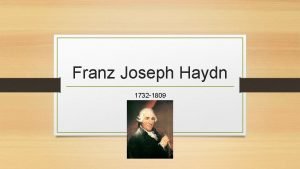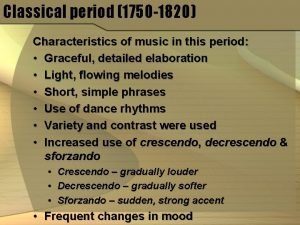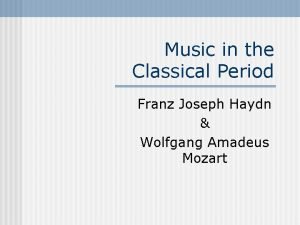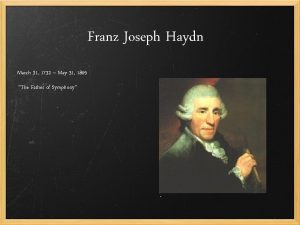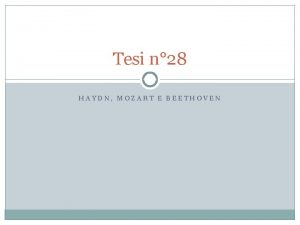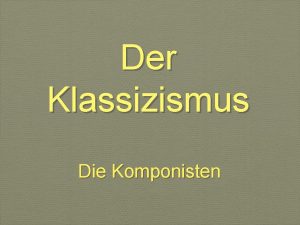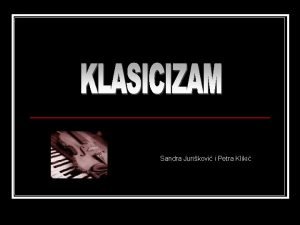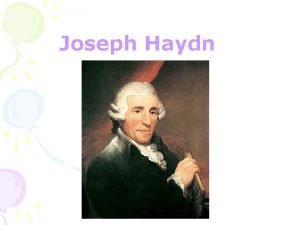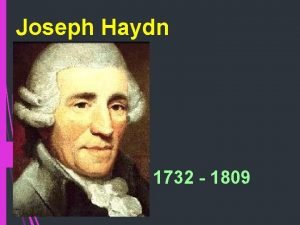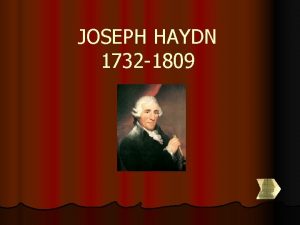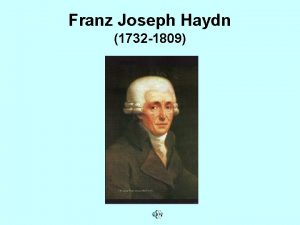FRANZ JOSEPH HAYDN 31 March 1732 31 May






- Slides: 6

FRANZ JOSEPH HAYDN 31 March 1732 – 31 May 1809

EARLY YEARS • Joseph Haydn was born in Rohrau, Austria, a village near the border with Hungary. • His father was a wheelwright who also served as "Marktrichter", an office akin to village mayor. His mother had previously worked as a cook in the palace of Count Harrach, the presiding aristocrat of Rohrau. Neither parent could read music; however, his father was an enthusiastic folk musician, who during the journeyman period of his career had taught himself to play the harp. • According to Haydn's later reminiscences, his childhood family was extremely musical, and frequently sang together and with their neighbors. • Haydn's parents knew that their son was musically gifted and knew that in Rohrau he would have no chance to obtain any serious musical training. So they accepted a proposal from their relative Johann Matthias Frankh, the schoolmaster and choirmaster in Hainburg, that Haydn be apprenticed to Frankh in his home to train as a musician. • Haydn therefore went off with Frankh to Hainburg and never again lived with his parents. He was about six years old.

FRANZ JOSEPH HAYDN • 1757 Haydn got a job under Count Morzin as Kapellmeister, a music director. He led the count's small orchestra and wrote his first symphonies for this ensemble. • In 1760, Haydn married. His wife was the former Maria Anna Aloysia Apollonia Keller. Haydn and his wife had a completely unhappy marriage, from which the laws of the time permitted them no escape; they both had other partners and never had any children. • When the Count ran out of money, he was forced to dismiss his musical establishment but Haydn was quickly offered a job as Vice-Kapellmeister with Prince Paul Anton in 1761. In 1766 he was promoted to full Kapellmeister. • He was Europe's leading composer and music instructor. He worked with musicians such as Mozart and Beethoven.

EXAMPLE OF COMPOSITION

HAYDN’S WORKS • He is often called the "Father of the Symphony" and "Father of the String Quartet" because of his important contributions to these forms. He was also instrumental in the development of the piano trio and in the evolution of sonata form. • 1791 The Symphony No. 94 in G major “Surprise Symphony” • 1783 Cello Concerto No. 2 in D • 1798 “The Creation” oratorio • 1797 String Quartets, Op. 76 • 1783 Keyboard Concerto No. 11

LETS LISTEN • Surprise Symphony https: //www. youtube. com/watch? v=l. Ljwkamp 3 l. I • Cello Concerto No. 2 in D https: //www. youtube. com/watch? v=TF_ai 27 A 9_U • “The Creation” oratorio https: //www. youtube. com/watch? v=S 03 cw. Guw 43 s • String Quartet Op. 76 No. 5 https: //www. youtube. com/watch? v=F 3 jx. LNx 6 d. UQ • Piano Concerto in D major https: //www. youtube. com/watch? v=m. ASt. Z 8 Av. OWw • Haydn trumpet concerto allegro https: //www. youtube. com/watch? v=RLDF 8 Oe. D-hc
